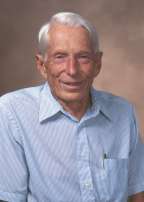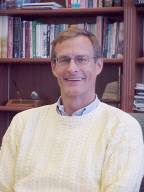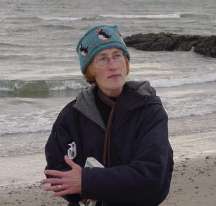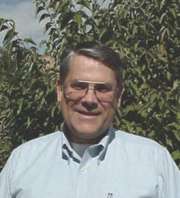geotimesheader
Society
Page
News about
people and
announcements
from
AGI's 35
member societies
______________________ |
To
post news in Society Page, send e-mail to geotimes@agiweb.org
with the subject: Society Page. |
Contents:
Legendary
Geoscientist
| On Nov. 12, the American Geological Institute (AGI) will present its
Legendary Geoscientist Award to Konrad Krauskopf of Stanford University.
Krauskopf earned his doctorate in chemistry at the University of California,
Berkeley, in 1934 and his second doctorate in geology at Stanford in 1939.
When he began his teaching career in 1939, geochemistry was a new term.
Over a span of five decades, Krauskopf has “provided scientists with the
original defining texts in geochemistry and physical geology,” says Gary
Ernst of Stanford University.
Krauskopf’s detailed studies have illuminated the parageneses of granitoids
and basement terranes in the Pacific Northwest, the volcanic eruptions
of the Parícutin, Transmexican Volcanic belt, and the regional petrologic
evolution of coastal Norway. Beyond his military service as a geologist
in World War II, Krauskopf has also served the nation as chair of the
National Research Council Board on Radioactive Waste Management.
In 1994, Krauskopf received the Mineralogical Society of America Distinguished
Public Service Medal. He is a member of the National Academy of Sciences
and served as president of AGI in 1964. |

Konrad Krauskopf,
life-long geochemist
Photo
courtesy of Krauskopf. |
Breaking
new waves
| On Oct. 5, Steven Bohlen, currently associate chief geologist at the
U.S. Geological Survey, accepted the position as president of the Joint
Oceanographic Institutions (JOI) and executive director of the Ocean Drilling
Program (ODP). He will join JOI/ODP on Nov. 27.
With the future of ODP transitioning in two years to the Integrated
Ocean Drilling Program (IODP), in close cooperation with Japan, “contributing
to the development of IODP will be a very challenging part of the job,”
Bohlen says.
As president of JOI, he says, he will provide opportunities for scientists
to contribute to the broader vision and program initiatives of the ocean
sciences in the context of what he calls the Earth Science Century ahead.
At the USGS, Bohlen has been responsible for $240 million of the research
funds in the federal budget to support the work of 1,800 scientists and
scientific support personnel. He has overseen the International Programs
Unit and also the peer review of USGS research through the National Research
Council of the National Academy of Sciences.
Bohlen was born July 12, 1952, in Indianapolis, Ind. He graduated from
Dartmouth College in 1974 and received a Ph.D. in geochemistry from the
University of Michigan in 1979. He succeeds Adm. James Watkins (U.S. Navy,
retired) who stepped down on Oct. 1. |

Steven Bohlen heads up
JOI/ODP
Image courtesy of the
USGS. |
Breaking
new ground
 AGI’s 1998-1999
Congressional Science Fellow, David Wunsch, has headed east from the Kentucky
Geological Survey to begin his new position in the “Granite State” as New
Hampshire State Geologist. “I spent the last 15 years in Kentucky working
in sedimentary basins, and it will be a nice change to work in New Hampshire,
which is underlain by crystalline rocks and Pleistocene deposits,” he says.
AGI’s 1998-1999
Congressional Science Fellow, David Wunsch, has headed east from the Kentucky
Geological Survey to begin his new position in the “Granite State” as New
Hampshire State Geologist. “I spent the last 15 years in Kentucky working
in sedimentary basins, and it will be a nice change to work in New Hampshire,
which is underlain by crystalline rocks and Pleistocene deposits,” he says.
He is looking forward to working with geologists and other scientists
from both the public and private sectors in order to meet the state goals
concerning resource management and geologic enterprise. “This is the ideal
job because you can still be involved in the political scene and on the
other side still have your hands on the professional side of geology,”
he says.
He would like to see the state mapped at the 1:24,000 scale to obtain
a better resolution of what has already been mapped at a larger scale.
He also hopes to raise the profile of the Geological Unit of the Department
of Environmental Services in New Hampshire.
Image courtesy of David Wunsch.
All-out educator
| The Association for Women Geoscientists (AWG) will present this year’s
Outstanding Educator Award to Suzanne O’Connell on Nov. 5 during the annual
meeting of the Geological Society of America. O’Connell, an executive committee
member of AGI, is currently taking leave from Wesleyan University in Middletown,
Conn., to work with high school programs in the Center for Interdisciplinary
Science at Trinity College in Hartford, Conn.
She is writing a proposal for Hartford high school students and Trinity
undergraduates to work together on restoring the south branch of the Park
River. “We’ll be cutting down trees and fences, cleaning up junk and monitoring
for flow, temperature and macroinvertebrate studies with the Department
of Environmental Protection,” O’Connell says.
At Trinity, O’Connell also works with nonscience classes, introducing
students to the geology at the mouth of the Connecticut River. |

Suzanne O'Connell
explores the minerals at
White Sands Beach
and Griswold Point on
Connecticut's
Long Island shore.
Image
courtesy of Duarte Machado. |
Hydrological
hurrahs
AGI will award this year’s Ian Campbell Medal to Luna Leopold, a professor
emeritus at the University of California, Berkeley. He was chief hydrologist
of the U.S. Geological Survey’s Water Resources Division from 1956 to 1966,
converting the division from one that primarily collected data to one that
also conducted research. He also established two observational networks
on rivers that still provide benchmarks for the study of airborne contaminants
of surface waters. With his numerous publications and public leadership,
Leopold has “led a quiet but complete revolution in our understanding of
streams and their landscapes, urban watersheds and environmental impact
and planning,” says Ernest Mancini, chair of the nominating committee.
Cultivating
honors
 USDA
soil scientist John Doran of the University of Nebraska-Lincoln will share
the stage this month in Athens, Greece, with a former French president,
Valery Giscard d’Estaing, and with Mikis Theodorakis, composer of the film
score for “Zobra the Greek.” Doran, who also joins the AGI Member Society
Council in November, is the recipient of an Onassis Foundation Award. The
late, Greek shipping magnate Aristotle Onassis established the foundation
to recognize individuals and organizations in all fields who have made
contributions to human interests.
USDA
soil scientist John Doran of the University of Nebraska-Lincoln will share
the stage this month in Athens, Greece, with a former French president,
Valery Giscard d’Estaing, and with Mikis Theodorakis, composer of the film
score for “Zobra the Greek.” Doran, who also joins the AGI Member Society
Council in November, is the recipient of an Onassis Foundation Award. The
late, Greek shipping magnate Aristotle Onassis established the foundation
to recognize individuals and organizations in all fields who have made
contributions to human interests.
The $240,000 award recognizes Doran’s work developing accessible soil-quality
indicators for farmers. He plans to give most of the money away to help
scientists pursue sabbatical-like training missions with organizations
dedicated to relieving global hunger and poverty. He points to the Land
Institute in Kansas and Harvest the Hope in California as two examples
of places scientists could study.
“My goal has always been to translate science into practice,” he says.
“We need to communicate with the urban sector of society the importance
of soil not only for producing food, clothes and shelter but as a major
interface in the planet.” He also supports measures that will help farmers
and other land managers receive adequate pay for their work.
Above: John Doran is sharing
the wealth. Image courtesy of J. Doran.
Associate Editor Christina Reed compiles
Society Page.


 AGI’s 1998-1999
Congressional Science Fellow, David Wunsch, has headed east from the Kentucky
Geological Survey to begin his new position in the “Granite State” as New
Hampshire State Geologist. “I spent the last 15 years in Kentucky working
in sedimentary basins, and it will be a nice change to work in New Hampshire,
which is underlain by crystalline rocks and Pleistocene deposits,” he says.
AGI’s 1998-1999
Congressional Science Fellow, David Wunsch, has headed east from the Kentucky
Geological Survey to begin his new position in the “Granite State” as New
Hampshire State Geologist. “I spent the last 15 years in Kentucky working
in sedimentary basins, and it will be a nice change to work in New Hampshire,
which is underlain by crystalline rocks and Pleistocene deposits,” he says.

 USDA
soil scientist John Doran of the University of Nebraska-Lincoln will share
the stage this month in Athens, Greece, with a former French president,
Valery Giscard d’Estaing, and with Mikis Theodorakis, composer of the film
score for “Zobra the Greek.” Doran, who also joins the AGI Member Society
Council in November, is the recipient of an Onassis Foundation Award. The
late, Greek shipping magnate Aristotle Onassis established the foundation
to recognize individuals and organizations in all fields who have made
contributions to human interests.
USDA
soil scientist John Doran of the University of Nebraska-Lincoln will share
the stage this month in Athens, Greece, with a former French president,
Valery Giscard d’Estaing, and with Mikis Theodorakis, composer of the film
score for “Zobra the Greek.” Doran, who also joins the AGI Member Society
Council in November, is the recipient of an Onassis Foundation Award. The
late, Greek shipping magnate Aristotle Onassis established the foundation
to recognize individuals and organizations in all fields who have made
contributions to human interests.
